492. The date given for the return of
the Pleiades in the evening could therefore possibly point to
another star 10 (= 33 - 23) right ascension days earlier than Cujam
(in "October 22 = 60 days before "December 21) - for Julius Caesar
had added a pair of months, July and August = 62
days):
... On
Hawaii the Rogo (Lono) effigy was set
off on its circuit 23 days before the December
solstice. And 64 - 41 = 23, which possibly means we
should use the time-frame of Bharani when naming
dates. When the Sun reached the Club of Hercules
(Cujam) in December 2 (336 = 320 + 16), then one
could count 336 - 64 = 272 (= 2 * 136) in order to
find SEPTEMBER 29 (→ 72 * 9 = 648) at the time of
the Bull. And 272 + 23 = 295 (10 lunar synodic
months)
→
"October 22 when
the Sun reached Cujam ...
| ka moe i roto |
te henua |
ihe manu ra |
8 |
 |
 |
 |
| Cb2-11 |
Cb2-12 (428 = 392 + 36) |
Cb2-13 |
|
CLOSE TO THE FULL
MOON: |
|
May 21
υ Persei (61.2) |
22 (21 + 121 = 142)
BEID (Egg) = ο¹ Eridani (62.2), μ Persei (62.8)
VINDEMIATRIX ( ε Virginis) |
23 (11 * 13 = 143)
Al Dabarān-2 (The Follower)
HYADUM I = γ Tauri (63.4)
*22.0 = *63.4 - *41.4 |
| 'April 24 |
25 (115 = 142 - 27) |
26 |
| "April 10 |
11 (101 = 142 - 41 = 78 + 23) |
12 |
| MARCH 18 |
19 (78 = 142 - 64) |
20 |
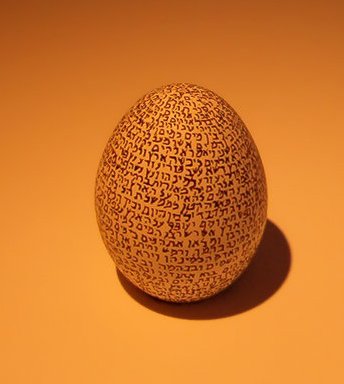 |
|
CLOSE TO THE SUN: |
| Nov 20 ψ Scorpii (244.6), LESATH (Sting) = ν Scorpii (244.8) |
21 (325) χ Scorpii (245.1), YED PRIOR (Hand in Front) = δ Ophiuchi, δ Tr. Austr. (245.5) |
22 YED POSTERIOR (Hand Behind) = ε Ophiuchi, RUKBALGETHI SHEMALI (Northern Knee of the Giant) = τ Herculis (246.6). δ Apodis (246.7), ο Scorpii (246.8) |
| 'Oct 24 |
25 |
26 (299 = 326 - 27) |
| "Oct 10 |
11 |
12 (285 = 326 - 41) |
| SEPT 17 |
18 |
19 (262 = 326 - 64) |
|
ku
kikiu - i te henua |
koia ra |
tagata tua ivi - te
henua |
tagata tua ivi - ki
te henua |
|
Ivi.
1.
Bone; fishbone. 2.
Ivi-tia,
sewing needle. 3.
Ivi tika, spine,
vertebra. 4. Ivi
atua, being of
the other world. 5.
Ivi tumu atua,
seer, wizard. 6.
Ivi heheu
swordfish. Vanaga.
1. Bone, needle;
ivi ika,
fishbone; ivi
ohio, needle;
ivi tika,
fishbone, backbone;
kiko o te ivi
tika, pancreas;
ivi heheu,
cachalot; ivi
tupapaku,
skeleton; ivi uha,
to grow (of
mankind); tooa te
kiko e ivi i
hakarere, to
strip the flesh from
the bones; kai
ivi, to eat
remnants; kore te
ivi, cooked too
much. 2. Parent,
family, ancestry.
Churchill. To bend
down to allow
someone to climb on
one's back to be
carried (haha);
he-ti-atu a Kaiga
i te tua ivi,
he-haha-mai Huri
Avai, Kaiga bent
his back and Huri
Avai climbed on his
shoulders. Vanaga. |
 |
 |
 |
 |
|
Cb2-22 (46 = 30 +
16) |
Cb2-23 |
Cb2-24 |
Cb2-25 |
|
CLOSE TO THE FULL
MOON: |
|
June 1 (152 = 136 +
16)
π4
Orionis (72.1),
ο¹
Orionis (72.4),
π5
Orionis (72.8)
*31.0 = *72.4 -
*41.4 |
2
π¹
Orionis (73.0),
ο²
Orionis (73.4),
HASSALEH =
ι
Aurigae
(73.6),
π6
Orionis (73.9)
*32.0 = *73.4 -
*41.4 |
3
ALMAAZ (The Male
Goat) =
ε
Aurigae
(74.7),
HAEDUS I =
ζ
Aurigae
(74.8) |
4 (365 + 155 = 520)
HAEDUS II = η
Aurigae
(75.9) |
|
'May 5 (125 = 152 -
27) |
6 |
7 |
8 (2 * 64) |
|
"April 21 (111 = 152
- 41) |
22 |
23 |
24 |
|
MARCH 29 (88 = 152 -
64) |
30 |
31 |
APRIL 1 |
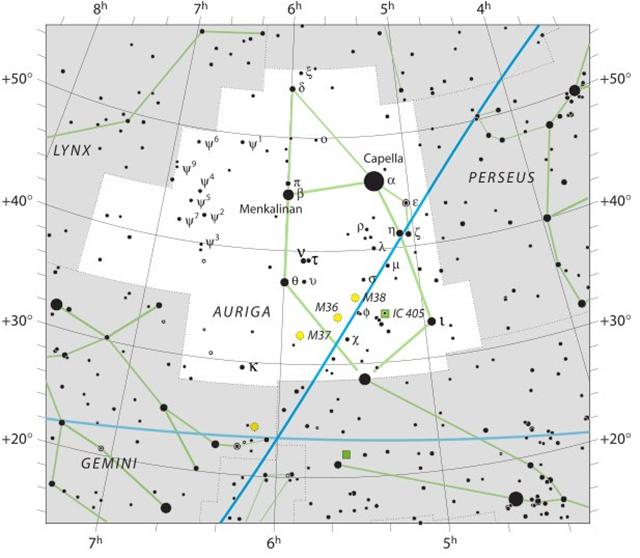 |
|
CLOSE TO THE SUN: |
|
Dec 1
Ophiuchi (255.3),
GRAFIAS (Claws) =
ζ
Scorpii
(255.4)
*214.0 = *255.4 -
*41.4 |
2 (336 = 320 + 16)
κ
Ophiuchi (256.2),
ζ
Arae (256.5),
ε
Arae (256.8),
CUJAM (Club) =
ε
Herculi
(256.9) |
3
no star listed (257) |
4
17h (258.7)
ARRAKIS = μ Draconis
(258.7) |
|
'Nov 4 |
5 |
6 (310 = 337 - 27) |
7 |
|
"Oct 21 |
22 (295 = 336 - 41) |
23 |
24 |
|
SEPT 28 |
29 (272 = 2 * 136) |
30 |
OCT 1 |
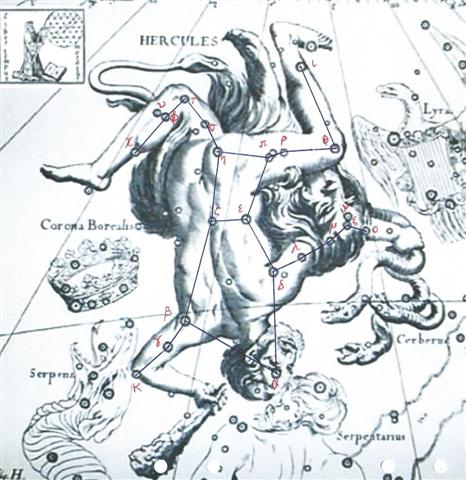 |
18 November, when the
Pleiades returned to visibility in
the evening, could then in a
way have corresponded to November 21
when Beid (the Egg) was at the Full
Moon. 18 November + 10 = 28
November (when the circuit of
Lono began) = 21 December - 23.
... The correspondence between the
winter solstice and the kali'i
rite of the Makahiki is
arrived at as follows: ideally, the
second ceremony of 'breaking the
coconut', when the priests assemble
at the temple to spot the rising of
the Pleiades, coincides with the
full moon (Hua tapu) of the
twelfth lunar month (Welehu). In
the latter eighteenth century, the
Pleiades appear at sunset on 18
November. Ten days later (28
November), the Lono effigy
sets off on its circuit, which lasts
twenty-three days, thus bringing the
god back for the climactic battle
with the king on 21 December, the
solstice (= Hawaiian 16 Makali'i). The
correspondence is 'ideal' and only
rarely achieved, since it depends on
the coincidence of the full moon and
the crepuscular rising of the
Pleiades ...
|
18 Nov (322)
Pleiades Above |
|
Dec 2 (336 = 295 + 41)
CUJAM
"Oct 22 (295 = 322 - 27)
SEPT 29 (272 = 322 - 50) |
... Savage tribes
knew the Pleiades familiarly, as
well as did the people of
ancient and modern civilization;
and Ellis wrote of the natives
of the Society and Tonga
Islands, who called these stars
Matarii, the Little Eyes:
The two seasons of the year were
divided by the Pleiades; the
first, Matarii i nia, the
Pleiades Above, commenced when,
in the evening, those stars
appeared on the horizon, and
continued while, after sunset,
they were above. The other
season, Matarii i raro,
the Pleiades Below, began when,
at sunset, they ceased to be
visible, and continued till, in
the evening, they appeared again
above the horizon. Gill gives a
similar story from the Hervey
group, where the Little Eyes are
Matariki, and at one time
but a single star, so bright
that their god Tane in
envy got hold of Aumea,
our Aldebaran, and, accompanied
by Mere, our Sirius,
chased the offender, who took
refuge in a stream.
Mere,
however, drained off the water,
and Tane hurled Aumea
at the fugitive, breaking him
into the six pieces that we now
see, whence the native name for
the fragments, Tauono,
the Six, quoted by Flammarion as
Tau, both titles
singularly like the Latin
Taurus. They were the favorite
one of the various avelas,
or guides at sea in night
voyages from one island to
another; and, as opening the
year, objects of worship down to
1857, when Christianity
prevailed throughout these
islands ...
|
te ua |
koia ra |
kua tuku ki
to mata - ki
tona tukuga |
e kiore -
henua - pa rei |
|
Pa.
1. Mgv.: pa,
an inclosure, a
fenced place.
Ta.: pa,
inclosure,
fortification.
Mq.: pa,
inclosure. Sa.:
pa, a
wall. Ma.: pa,
a fort. 2. Mgv.:
pa, to
touch. Sa.:
pa'i, id.
Ma.: pa,
id. 3. Mgv.:
pa, to
prattle. Ta.:
hakapapa, to
recount. 4. Mq.:
pa, a
hook in bonito
fishing. Sa.:
pa, a
pearlshell
fishhook. Ma.:
pa, a
fishhook. Pau.:
hakapa,
to feel, to
touch. Mgv.:
akapa, to
feel, to touch,
to handle
cautiously.
|
 |
 |
 |
 |
|
Cb2-4 (420 = 7 *
60) |
Cb2-5 |
Cb2-6 (30) |
Cb2-7 |
|
CLOSE TO THE
FULL MOON: |
|
May 14
δ Persei (54.7) |
15 (500 = 365 +
135)
Al Thurayya-27
(Many Little
Ones) /
Krittikā-3
(Nurses of
Kārttikeya) /
TAU-ONO (Six
Stones)
ATIKS =
ο
Persei,
RANA (Frog) =
δ
Eridani
(55.1),
CELAENO (16
Tauri), ELECTRA
(17), TAYGETA
(19),
ν
Persei (55.3),
MAIA (20),
ASTEROPE (21),
MEROPE (23)
(55.6) |
16 (136)
Hairy Head-18
(Cockerel) /
Temennu-3
(Foundation
Stone)
ALCYONE
(56.1),
PLEIONE (28
Tauri), ATLAS
(27 Tauri)
(56.3) |
17
MENKHIB (Next to
the Pleiades =
ζ
Persei
(57.6)
PORRIMA (γ
Virginis) |
|
'April 17 |
18 (108) |
19 (475 = 19 *
25) |
20 |
|
"April 3
|
4 |
5 |
6 (96) |
|
MARCH 11 |
12 (135 - 64 =
71) |
13 |
14 (→ π) |
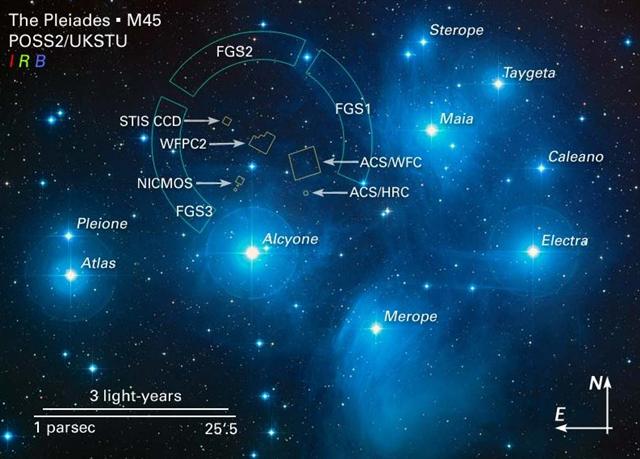 |
|
CLOSE TO THE
SUN: |
|
Nov 13
κ
Librae (237.2),
ι
Serpentis
(237.4),
ψ²
Lupi,
ρ
Oct.
(237.5), γ Cor.
Borealis, η
Librae (237.7),
COR
SERPENTIS = α
Serpentis
(237.9)
*196.0 = *237.4
- *41.4 |
14
π
Cor. Borealis,
UNUK ELHAIA
(Necks of the
Serpents) =
λ
Serpentis
(238.1),
CHOW =
β
Serpentis
(238.6) |
15
κ
Serpentis
(239.3),
δ
Cor. Borealis,
TIĀNRŪ =
μ
Serpentis
(239.5),
χ
Lupi, (239.6),
ω
Serpentis
(239.7),
BA (= Pa) =
ε
Serpentis,
χ
Herculis
(239.8).
κ
Cor.
Borealis, ρ
Serpentis
(239.9) |
16 (320)
λ
Librae (240.0),
β
Tr. Austr.
(240.3),
κ
Tr. Austr.
(240.4),
ρ
Scorpii (240.8)
*199.0 = *240.4
- *41.4 |
|
'Oct 17 |
18 |
19 (292 = 4 *
73) |
20 |
|
"Oct 3 |
4 (277) |
5 |
6 |
|
SEPT 10 |
11 |
12 (255 = 3 *
85) |
13 |
We should
count (hia) 33
days after Alcyone, they
said on Hawaii, and so,
evidently, did the
creator of the C text
(according to Metoro):
|
manu
rere |
tagata -
hanau
hia |
kiore
- henua |
 |
 |
 |
|
Cb3-13
(454) |
Cb3-14
(63 = 30
+ 33 =
59 + 4) |
Cb3-15
(348 -
62) |
|
CLOSE TO THE FULL
MOON: |
|
June 17
(84 + 84
= 336 -
168)
Ardra-6
(The
Moist
One) /
ANA-VARU-8
(Pillar
to sit
by)
χ¹
Orionis,
ξ
Aurigae
(88.1),
BETELGEUZE
=
α
Orionis
(88.3),
ξ
Columbae
(88.5),
σ
Columbae
(88.7)
ZUBEN
ELGENUBI
(α
Librae) |
18
η
Leporis
(89.0),
PRAJA-PĀTI
(Lord of
Created
Beings)
=
δ
Aurigae,
MENKALINAN
(Shoulder
of the
Rein-holder)
=
β
Aurigae,
MAHASHIM
(Wrist)
=
θ
Aurigae,
and
γ
Columbae
(89.3),
π
Aurigae
(89.4),
η
Columbae
(89.7)
*48.0 =
*89.4 -
*41.4 |
19
μ
Orionis
(90.3),
χ²
Orionis
(90.5) |
|
'May 21 |
22 (142) |
23 |
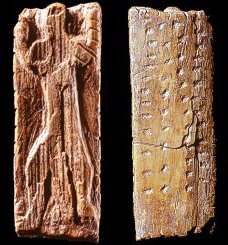
... The earliest depiction that has been linked to the constellation of Orion is a prehistoric (Aurignacian) mammoth ivory carving found in a cave in the Ach valley in Germany in 1979. Archaeologists have estimated it to have been fashioned approximately 32,000 to 38,000 years ago ... The artist cut, smoothed and carved one side (A) and finely notched the other side (B) and the edges. Side A contains the half-relief of an anthropoidal figure, either human or a human-feline hybrid, known as the 'adorant' because its arms are raised as if in an act of worship.
| Egyptian jubilation |
 |
Phoenician he |
 |
Greek epsilon |
Ε (ε) |
|
Wikipedia points at the Egyptian gesture with arms held high as a Sign of jubilation, which may have been the origin (via Phoenician he) of epsilon.


|
On side B together with the four edges is a series of notches that are clearly set in an intentional pattern. The edges contain a total of 39 notches in groups of 6, 13, 7 and 13. A further 49 notches on side B are arranged in four vertical lines of 13, 10, 12 and 13 respectively plus a further notch that could be in either of the middle two lines ... The grouping of the notches on the plate suggests a time-related sequence. The total number of notches (88) not only coincides with the number of days in 3 lunations (88.5) but also approximately with the number of days when the star Betelgeuse (α Ori) disappeared from view each year between its heliacal set (about 14 days before the spring equinox around 33,000 BP) and its heliacal rise (approximately 19 days before the summer solstice).
Conversely, the nine-month period when Orion was visible in the sky approximately matched the duration of human pregnancy, and the timing of the heliacal rise in early summer would have facilitated a ‘rule of thumb’ whereby, by timing conception close to the reappearance of the constellation, it could be ensured that a birth would take place after the severe winter half-year, but leaving enough time for sufficient nutrition of the baby before the beginning of the next winter. There is a resemblance between the anthropoid on side A and the constellation Orion. None of these factors is convincing when taken in isolation, because of the high probability that apparently significant structural and numerical coincidences might have arisen fortuitously. However, taken together they suggest that the anthropoid represented an asterism equivalent to today’s constellation of Orion, and that the ivory plate as a whole related to a system of time reckoning linked to the moon and to human pregnancy. If so, then ethnographic comparisons would suggest that the Geißenklösterle culture related their ‘anthropoid’ asterism to perceived cycles of cosmic power and fertility ...
|
|
CLOSE TO
THE SUN: |
|
Dec 17
RUKBALGETHI
GENUBI
(Bending
Claw) =
θ
Herculis
(271.1),
ξ
Herculis
(271.5),
ETAMIN
(Head) =
γ
Draconis,
ν
Herculis
(271.7),
ν
Ophiuchi
(271.8) |
18 (352
= 348 +
4)
Cat's
Eye =
NGC6543
Draconis
(272.2),
ζ
Serpentis
(272.4),
τ
Ophiuchi
(272.9)
*231.0 =
*272.4 -
*41.4 |
19
Winnowing
Basket-7
(Leopard)
18h
(273.4)
NASH
(Point)
=
γ
Sagittarii
|
|
'Nov 20 |
21 (325) |
22 |
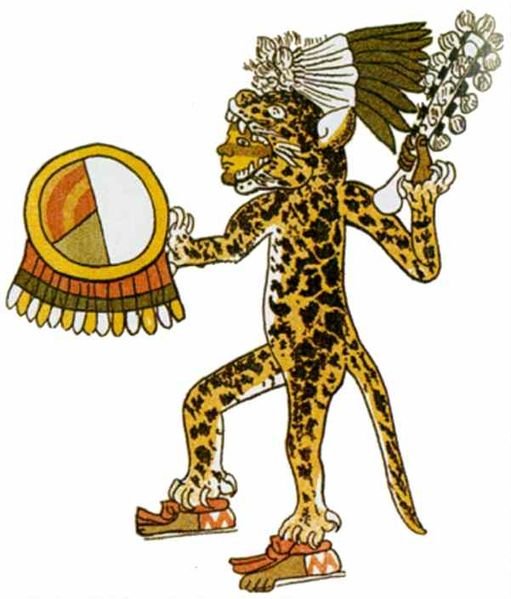 |
|
henua
kua hoi |
kua
ka te
ahi o te
henua |
o te
henua
kua hoi |
ko te
henua
kua vero
te ahi |
kiore
- henua |
 |
 |
 |
 |
 |
|
Cb3-16 |
Cb3-17
(66 = 30
+ 36) |
Cb3-18 |
Cb3-19
(460 =
392 +
68) |
Cb3-20 |
|
CLOSE TO
THE FULL
MOON: |
|
June 20
6h
(91.3)
ν
Orionis
(91.4),
θ
Columbae
(91.5),
π
Columbae
(91.6)
*50.0 =
*91.4 -
*41.4 |
Solstice
ξ
Orionis
(92.5) |
22
Al
Han'ah-4
(Brand)
/
Maru-sha-pu-u-mash-mashu-7
(Front
of the
Mouth of
the
Twins)
TEJAT
PRIOR =
η
Gemini
(93.4),
γ
Monocerotis
(93.5),
κ
Aurigae
(93.6),
κ
Columbae
(93.8)
*52.0 =
*93.4 -
*41.4 |
23
FURUD =
ζ Canis
Majoris
(94.9) |
24 (365
+ 175 =
540)
Well-22
(Tapir)
/
Arkū-sha-pu-u-mash-mashu-8
(Back
of the
Mouth of
the
Twins)
δ
Columbae
(95.2),
TEJAT
POSTERIOR
=
μ
Gemini,
MIRZAM
(The
Roarer)
=
β
Canis
Majoris
(95.4),
CANOPUS
(Canopy)
=
α
Carinae
(95.6),
ε
Monocerotis
(95.7),
ψ1
Aurigae
(95.9)
*54.0 =
*95.4 -
*41.4 |
|
'May 24
(12 *
12) |
25 |
26 (146
= 173 -
27) |
27 |
28 |
|
"April
30 (130) |
"May 1 |
2 |
3 |
4 |
|
APRIL 17 |
18 (108
= 172 -
64) |
19 |
20 |
21 |
 |
|
CLOSE TO
THE SUN: |
|
Dec 20
(354 =
350 + 4)
Zhōngshān
(274.0),
π
Pavonis
(274.6) |
Solstice
ι
Pavonis
(275.1),
POLIS =
μ
Sagittarii
(275.9)
MENKAR
(α Ceti) |
22
η
Sagittarii
(276.9) |
Purva
Ashadha-20
(Winnowing
Basket) |
|
23
KAUS
MEDIUS =
δ
Sagittarii,
κ Lyrae
(277.5),
TUNG HAE
(Heavenly
Eastern
Sea) = η
Serpentis
(277.7),
SHAOU
PIH
(Minor
Minister)
= φ
Draconis
(277.8),
KWEI SHE
= χ
Draconis
(277.9) |
24
φ
Oct.
(278.1),
KAUS
AUSTRALIS
=
ε
Sagittarii
(278.3),
ξ
Pavonis
(278.4),
AL
ATHFAR
(The
Talons
of the
Falling
Eagle) =
μ
Lyrae
(278.6)
*237.0 =
*278.4 -
*41.4 |
|
'Nov 23
(354 -
27 =
327) |
24 |
25 (329
= 146 +
183) |
26 |
27 |
|
"Nov 9
(354 -
41 =
313) |
→ π |
11 |
12 |
13 |
|
OCT 17 |
18 (291
= 355 -
64) |
19 |
20 |
21 |

... As
has
already
been
mentioned,
the
Delphians
worshipped
Dionysus
once a
year as
the
new-born
child,
Liknites,
'the
Child in
the
Harvest
Basket',
which
was a
shovel-shaped
basket
of rush
and
osier
used as
a
harvest
basket,
a
cradle,
a
manger,
and a
winnowing-fan
for
tossing
the
grain up
into the
air
against
the
wind, to
separate
it from
the
chaff.
The
worship
of the
Divine
Child
was
established
in
Minoan
Crete,
its most
famous
early
home in
Europe.
In 1903,
on the
site of
the
temple
of
Dictaean
Zeues -
the Zeus
who was
yearly
born in
Rhea's
cave at
Dicte
near
Cnossos,
where
Pythagoras
spent
'thrice
nine
hallowed
days' of
his
initiation
- was
found a
Greek
hymn
which
seems to
preserve
the
original
Minoan
formula
in which
the
gypsum-powdered,
sword-dancing
Curetes,
or
tutors,
saluted
the
Child at
his
birthday
feast.
In it he
is
hailed
as 'the
Cronian
one' who
comes
yearly
to Dicte
mounted
on a sow
and
escorted
by a
spirit-throng,
and
begged
for
peace
and
plenty
as a
reward
for
their
joyful
leaps
... |
|


























